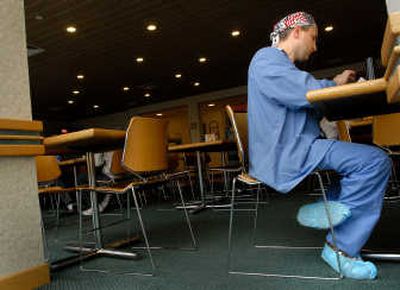Empire Health buyout detailed

One of the nation’s largest hospital chains has proposed paying at least $168 million for Deaconess Medical Center and Valley Hospital and Medical Center.
In separate letters filed with Washington state regulators, Community Health Systems Inc. wrote that it intended to pay cash and assume debts totaling $129.2 million for Deaconess and another $38.5 million for Valley. The sums are most – but not all – of the money Community intends to pay as part of its buyout of Empire Health Services said Ron McKay, chairman of Empire’s board of directors.
The final price tag on Spokane’s century-old health care provider will be released as part of a voluminous filing Community will make as early as mid-December. The figure will be vetted by Washington government officials to ensure it is fair.
The regimen requires an independent valuation of the deal by outside experts, a review by the state attorney general’s office and a final decision by the state Department of Health.
If successful, the two hospitals owned by Empire Health Services would be folded into a company already running 127 hospitals in 28 states.
Empire board Chairman Ron McKay has said about $100 million would be infused into a new Spokane charitable foundation. The deal would also include money routed into a separate account to pay back about $70 million in tax-exempt bonds that are now secured by Empire assets, said Keith Anderson, an outside attorney hired by Empire to help it close the transaction.
The proposed sale of Empire marks the second time that a nonprofit hospital would be sold to a for-profit hospital system in Washington state.
At issue will be whether operators of Empire have made good and careful decisions in choosing to sell to a for-profit corporation, said Bart Eggen, executive manager of the state’s office for certification and technical support.
“There will be the utmost of scrutiny,” said Eggen, adding that state officials have never shied away from denying proposals for certificates of need or, more famously, Premera Blue Cross’s bid for a for-profit insurance company conversion.
“I don’t think anything is a rubber stamp,” he added.
Scrutiny will include, among other things, whether Empire officials have negotiated a fair price and how they intend to manage the public assets – proceeds estimated at $100 million – that must be transferred to a new, independent charitable foundation.
Community officials filed letters of intent to apply for certificates of need for the two hospitals on Nov. 9, state records showed. The company must wait at least 30 days – until Dec. 9 – before submitting completed CON applications, documents required to operate, renovate or expand state hospitals, nursing homes and other health facilities.
“The letter of intent is just really a pre-notice in regards to what would be expected in an application,” said Janis Sigman, director of the certificate of need program.
The company likely would submit a conversion application at the same time, Eggen said, starting the clock on the review that could take at least five months.
Applications must be screened within 15 working days of submission. The reviews of the CON and the conversion proposals begin within five working days after state officials receive completed applications. The state must post notices about the applications in local newspapers and notify by mail, fax or e-mail anyone who requests information, regulations state.
Eggen said the department has asked Community to provide the information on compact discs that can be copied and distributed to anyone who requests them.
A public hearing must be held within 45 calendar days of receipt of a completed application, and the attorney general’s office must provide a written opinion of the deal within 45 calendar days of that. Health department officials must complete an analysis within 30 calendar days after the attorney general’s opinion, unless extensions are requested.
All told, it could be April – at the earliest – before a decision is final. And it might take longer than that if public response or other factors force delays.